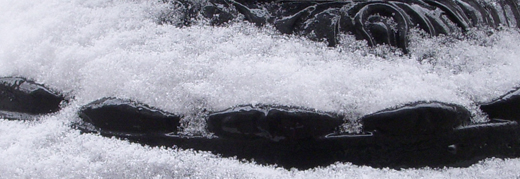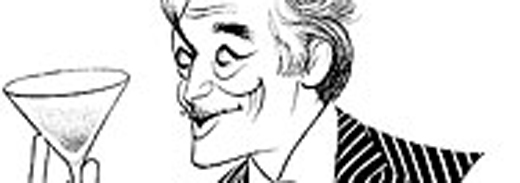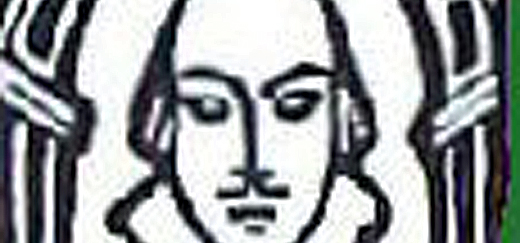
It was very cold in Manhattan today, but I spent a great deal of it out on the sidewalks. I won’t say that I was thrilled to be chilled, but it was good to be doing things that were refreshingly hard, even if nothing more demanding than putting one frozen foot in front of the other was called for.
My walks took me to interesting encounters. For the first time, my new barber asked me my name. He worked for quite a while at my old barber shop, now shuttered, before setting up his own shop not too far away. He hails from Peru and I would trust him with my life. Knowing that he’s a big Obama fan, I asked him if he thought that the President will give up smoking. “Yes,” was his bitingly terse reply. “He has to: he’s got kids.” And that was that. Memo to the White House: This is how the people who love you feel.
My plan was to take the subway down to 51st Street, for lunch with my friend Diana. But Willy was done with clipping my beard shortly before eleven. The only way of filling the time between engagements would be on the hoof. That is, walking thirty blocks was the only way to salve my wine-girdled conscience. Without passing into insobriety, I have almost drunk myself out of my trousers. Exercise!
Walking down Second Avenue, I listened to Teach Yourself Dutch on the Nano. I have listened to Units Twelve through Sixteen so many times that I unthinkingly understand such phrases as “Dish ye frog ya partner” as Dus je vraag je partner — “So you ask your partner….” Such comprehension is totally remarkable, because I haven’t listened to my language courses, Nederlands or otherwise, in so long that the battery on the Nano had completely run out of juice.
I want you to know that I am not brushing up on my Nederlands because I think that it would enrich a conversation about Netherland with its Hague-raised author, Joseph O’Neill.
Over coffee, at the end of lunch, Diana pulled a book out of her bag. It was a first edition of A Question of Upbringing, the first volume of Anthony Powell’s Dance to the Music of Time. At the bottom of the dust jacket — slight tear at the top, otherwise very fine — a cartouche contained the notice, “By the author of Afternoon Men.” That’s like finding an edition of Du côté de chez Swann that identifies Proust as the author of Jean Santeuil. Or nearly. “I’m sure that you’ve read this, but I can never remember,” said Diana. I pointed to the cartouche in my best bandbox manner and told her that I’d even read Afternoon Men. In short, I was utterly undeserving of what came next: the offer of all twelve firsts — all, as I knew from earlier inspection, in v gd dust jackets — as a gift!
I ought to have said “Thank you!”, I know. But perhaps because I felt too much like a cat burglar who’s been offered the Hope Diamond by a blood relative, I had to deflect the offer. It’s one thing to sell what you steal! After much soul searching, back in the Eighties, I realized that I am not a bibliophile. I may be crazy about the contents of books, but books themselves don’t interest me that much — unless they’re inscribed with blushmaking generosity by the author. I’m one of those philistines whose first response to first editions, as to antiques, is “used.” So I insisted to Diana that we contact Baumann and the other book dealers, and find out what she might realize upon a sale of the set. (Early indications suggest that as much as $12,500 is not inconceivable.)
Walking home — I walked home as well! — all I could think of what was a brute I’d been not to thank Diana for the offer. Having mentally rejected it on the highest moral ground, I got lost in transactional mode. Now I must call her tomorrow to apologize.
I ventured forth in the evening, at about six, for an “event” at the Barnes & Noble branch on Warren Street in Tribeca. I had never been there before, but then neither had, by his own confession, Sam Tanenhaus, editor of The New York Times Book Review and the event’s panelist-in-chief. The published purpose of the panel, the constitution of which I’ll get to in a minute, was to discuss the Book Review’s choice of the ten best books of 2008. But that discussion never took place.Â
This is not the time to retail Mr Tanenhaus’s remarks about the running of the Book Review, nor to delve into the many interesting things that he and colleagues Liesl Schillinger and Dwight Garner had to say about book reviews. (My disinclination to be discovered as the weekly author of generally disapproving reviews of the Book Review can be imagined.) Nor do I intend to transcribe the wit and wisdom of ringer panelist Joseph O’Neill, except to mention that, when asked by Mr Tanenhaus what he thought about James Wood’s warmly favorable review of Netherland, he replied, in a way that produced gratified laugher from the crowd, that he understood at last why Mr Wood is held in such high esteem by literary types. No; all of that will have to wait.
All I’m going to say right now is that when I thrust yet another copy of Netherland at Mr O’Neill for him to sign, he brightened, recognizing me —not a challenge — and told me that I was “incorrigible.” Little did he know that I’d thought about not going, lest he regard me as a weird if harmless literary stalker. I wanted to say, “I’m here for the Book Review, not for you” (true!), but instead I thanked him for recommending Richard Yates’s The Easter Parade, when we talked at the McNally Jackson affair last summer. I wanted to say that The Easter Parade had opened up my understanding of Revolutionary Road, now a major motion picture starring Kate Winslet, for whom there is probably not a part in any conceivable adaptation of Netherland. Instead, I withdrew the latest issue of Harper’s from my bag and asked him to autograph “The World of Cheese.” If he remembered, wearily, that I’d rewarded his Yates recommendation by asking him to sign his first novel, his family memoir, and his Granta piece about the Trinidadian environmentalist from whom he drew the inspiration for Chuck Ramkissoon, he didn’t show it. Instead, having obliged, he flashed the smile of a proud ten year-old for whom you can’t help hoping for the best possible future and said, “That’s my first short story.”
At dinner, afterward, Kathleen said, “See? I told you you’d be glad you went.”
When I wasn’t feeling guilty about not thanking Diana, on the walk home, I was remembering one of those “literary episodes” that aren’t literary at all, but just tangentially related to the world of books. This happened a few years ago. I was reading the one-volume reduction, as it were, of Anthony Powell’s memoirs, entitled To Keep the Ball Rolling. I was reading it, specifically, during an exam by my internist, who may be a reader but who is definitely a basketball player. “Who’s that?” he asked, upon espying the v gd dust jacket. I muttered the usual swallowed embarrassments, desperate not to be an instructing bore. “Huh!” said the good doctor, whom I do trust with my life. “He looks just like Joe Di Maggio!”
I took another look, and saw that it was quite true. Only this afternoon, though, did I wonder what Powell would have made of the perceived resemblance.



















